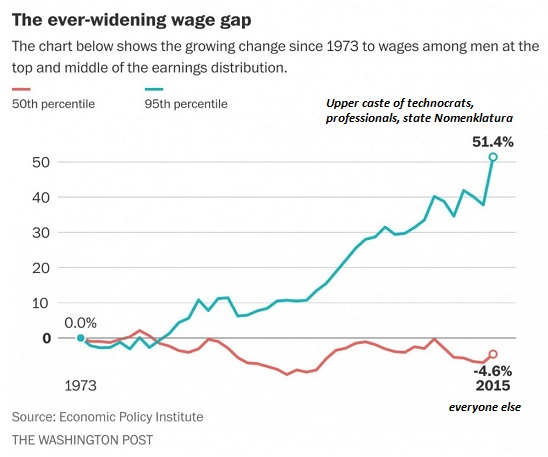
Submitted by Charles Hugh-Smith of OfTwoMinds blog,
The problem is that limiting financialization will implode the system.
The majority of American households feel poorer because they are poorer. Real (i.e. adjusted for inflation) median household income has declined for decades, and income gains are concentrated in the top 5%:
Even more devastating, wages' share of GDP has been declining (with brief interruptions during asset bubbles) for 46 years. That means that as gross domestic product (GDP) has expanded, the gains have flowed to corporate and owners' profits and to the state, which is delighted to collect higher taxes at every level of government, from property taxes to income taxes.
[image]https://www.oftwominds.com/photos2016/wages-GDP5-16a.png[/image]
Here's a look at GDP per capita (per person) and median household income. Typically, if GDP per capita is rising, some of that flows to household incomes. In the 1990s boom, both GDP per capita and household income rose together.
Since then, GDP per capita has marched higher while household income has declined. Household income saw a slight rise in the housing bubble, but has since collapsed in the "recovery" since 2009.
[image]https://www.oftwominds.com/photos2016/GDP-income5-16a.png[/image]
These are non-trivial trends. What these charts show is the share of the GDP going to wages/salaries is in a long-term decline: gains in GDP are flowing not to wage-earners but to shareholders and owners, and through their higher taxes, to the government.
The top 5% of wage earners has garnered virtually all the gains in income.
The sums are non-trivial as well. America's GDP in 2015 was about $18 trillion. Wages' share--about 42.5%--is $7.65 trillion.
If wage's share was 50%, as it was in the early 1970s, its share would be $9 trillion. That's $1.35 trillion more that would be flowing to wage earners.
That works out to $13,500 per household for 100 million households.
While it's easy to spout political promises to "fix" this secular trend, it isn't that easy. Technology and global competition has raised the premium on technology and managerial workers and reduced the premium on most conventional jobs.
Financialization has increased the share of profits and GDP that flow to financiers and the financial sector.
Crony-state capitalism has imposed rentier monopolies and cartels on wage earners, effectively transferring more of the nation's income and wealth to politically powerful entrenched interests and cartels.
The problem is that limiting financialization will implode the system, as I explain in my new book Why Our Status Quo Failed and Is Beyond Reform. The status quo now depends on financialization for its profits and taxes, and so ripping the heart out of financial skims and scams will also rip the heart out of the entire status quo.
And so 95% of us will continue to get poorer, no matter who's in office.